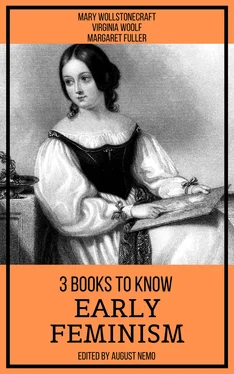Rakes know how to work on their sensibility, whilst the modest merit of reasonable men has, of course, less effect on their feelings, and they cannot reach the heart by the way of the understanding, because they have few sentiments in common.
It seems a little absurd to expect women to be more reasonable than men in their likings, and still to deny them the uncontrouled use of reason. When do men fall-in-love with sense? When do they, with their superiour powers and advantages, turn from the person to the mind? And how can they then expect women, who are only taught to observe behaviour, and acquire manners rather than morals, to despise what they have been all their lives labouring to attain? Where are they suddenly to find judgment enough to weigh patiently the sense of an awkward virtuous man, when his manners, of which they are made critical judges, are rebuffing, and his conversation cold and dull, because it does not consist of pretty repartees, or well turned compliments? In order to admire or esteem any thing for a continuance, we must, at least, have our curiosity excited by knowing, in some degree, what we admire; for we are unable to estimate the value of qualities and virtues above our comprehension. Such a respect, when it is felt, may be very sublime; and the confused consciousness of humility may render the dependent creature an interesting object, in some points of view; but human love must have grosser ingredients; and the person very naturally will come in for its share — and, an ample share it mostly has!
Love is, in a great degree, an arbitrary passion, and will reign, like some other stalking mischiefs, by its own authority, without deigning to reason; and it may also be easily distinguished from esteem, the foundation of friendship, because it is often excited by evanescent beauties and graces, though, to give an energy to the sentiment, something more solid must deepen their impression and set the imagination to work, to make the most fair — the first good.
Common passions are excited by common qualities. — Men look for beauty and the simper of good-humoured docility: women are captivated by easy manners; a gentleman-like man seldom fails to please them, and their thirsty ears eagerly drink the insinuating nothings of politeness, whilst they turn from the unintelligible sounds of the charmer — reason, charm he never so wisely. With respect to superficial accomplishments, the rake certainly has the advantage; and of these females can form an opinion, for it is their own ground. Rendered gay and giddy by the whole tenor of their lives, the very aspect of wisdom, or the severe graces of virtue, must have a lugubrious appearance to them; and produce a kind of restraint from which they and love, sportive child, naturally revolt. Without taste, excepting of the lighter kind, for taste is the offspring of judgment, how can they discover that true beauty and grace must arise from the play of the mind? and how can they be expected to relish in a lover what they do not, or very imperfectly, possess themselves? The sympathy that unites hearts, and invites to confidence, in them is so very faint, that it cannot take fire, and thus mount to passion. No, I repeat it, the love cherished by such minds, must have grosser fewel!
The inference is obvious; till women are led to exercise their understandings, they should not be satirized for their attachment to rakes; or even for being rakes at heart, when it appears to be the inevitable consequence of their education. They who live to please — must find their enjoyments, their happiness, in pleasure! It is a trite, yet true remark, that we never do any thing well, unless we love it for its own sake.
Supposing, however, for a moment, that women were, in some future revolution of time, to become, what I sincerely wish them to be, even love would acquire more serious dignity, and be purified in its own fires; and virtue giving true delicacy to their affections, they would turn with disgust from a rake. Reasoning then, as well as feeling, the only province of woman, at present, they might easily guard against exteriour graces, and quickly learn to despise the sensibility that had been excited and hackneyed in the ways of women, whose trade was vice; and allurements, wanton airs. They would recollect that the flame, one must use appropriated expressions, which they wished to light up, had been exhausted by lust, and that the sated appetite, losing all relish for pure and simple pleasures, could only be roused by licentious arts or variety. What satisfaction could a woman of delicacy promise herself in a union with such a man, when the very artlessness of her affection might appear insipid? Thus does Dryden describe the situation,
-’Where love is duty, on the female side,
‘On theirs mere sensual gust, and sought with surly pride.’
But one grand truth women have yet to learn, though much it imports them to act accordingly. In the choice of a husband, they should not be led astray by the qualities of a lover — for a lover the husband, even supposing him to be wise and virtuous, cannot long remain.
Were women more rationally educated, could they take a more comprehensive view of things, they would be contented to love but once in their lives; and after marriage calmly let passion subside into friendship — into that tender intimacy, which is the best refuge from care; yet is built on such pure, still affections, that idle jealousies would not be allowed to disturb the discharge of the sober duties of life, or to engross the thoughts that ought to be otherwise employed. This is a state in which many men live; but few, very few women. And the difference may easily be accounted for, without recurring to a sexual character. Men, for whom we are told women were made, have too much occupied the thoughts of women; and this association has so entangled love with all their motives of action; and, to harp a little on an old string, having been solely employed either to prepare themselves to excite love, or actually putting their lessons in practice, they cannot live without love. But, when a sense of duty, or fear of shame, obliges them to restrain this pampered desire of pleasing beyond certain lengths, too far for delicacy, it is true, though far from criminality, they obstinately determine to love, I speak of the passion, their husbands to the end of the chapter — and then acting the part which they foolishly exacted from their lovers, they become abject wooers, and fond slaves.
Men of wit and fancy are often rakes; and fancy is the food of love. Such men will inspire passion. Half the sex, in its present infantine state, would pine for a Lovelace; a man so witty, so graceful, and so valiant: and can they deserve blame for acting according to principles so constantly inculcated? They want a lover, and protector; and behold him kneeling before them — bravery prostrate to beauty! The virtues of a husband are thus thrown by love into the background, and gay hopes, or lively emotions, banish reflection till the day of reckoning comes; and come it surely will, to turn the sprightly lover into a surly suspicious tyrant, who contemptuously insults the very weakness he fostered. Or, supposing the rake reformed, he cannot quickly get rid of old habits. When a man of abilities is first carried away by his passions, it is necessary that sentiment and taste varnish the enormities of vice, and give a zest to brutal indulgences; but when the gloss of novelty is worn off, and pleasure palls upon the sense, lasciviousness becomes barefaced, and enjoyment only the desperate effort of weakness flying from reflection as from a legion of devils. Oh! virtue, thou art not an empty name! All that life can give — thou givest!
If much comfort cannot be expected from the friendship of a reformed rake of superiour abilities, what is the consequence when he lacketh sense, as well as principles? Verily misery, in its most hideous shape. When the habits of weak people are consolidated by time, a reformation is barely possible; and actually makes the beings miserable who have not sufficient mind to be amused by innocent pleasure; like the tradesman who retires from the hurry of business, nature presents to them only a universal blank; and the restless thoughts prey on the damped spirits. [49]Their reformation, as well as his retirement, actually makes them wretched because it deprives them of all employment, by quenching the hopes and fears that set in motion their sluggish minds.
Читать дальше












